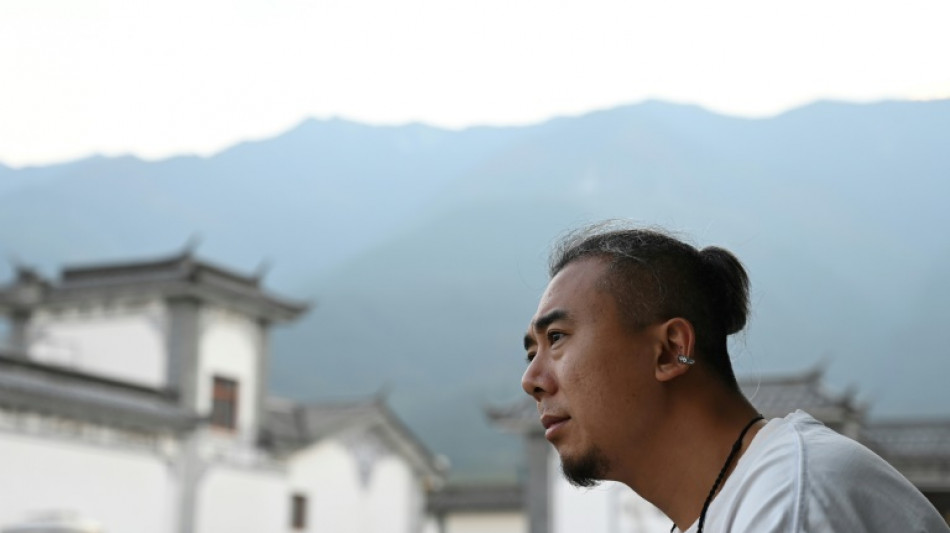

Jaded young Chinese reset lives with rural 'retirement'
Wang Dong hasn't worked for months and doesn't plan to, whiling away his days at a lakeside town as one of a growing number of young Chinese "retiring" in the countryside.
Extended breaks from work were long unheard of in China, with its fiercely competitive office culture and where officials vaunt the blood and sweat behind the nation's rise.
But some are pushing back, giving themselves mental space to recover from burnout, feed the soul and consider other ways to contribute to society.
"All of us have different things going on at any one time and we need to pay attention to our present moment," the 29-year-old Wang said at a self-styled "youth retirement home" in Dali in China's scenic southwestern Yunnan province.
"It's been very meaningful for me to experience things during this period that can't be judged in material terms," he said.
Wang pitched up at the hostel this year after growing jaded with his job in hospitality.
Since then he has passed the time by visiting a temple, practising traditional tea preparation, going on outings with new friends or simply lazing around.
He said he would stay for at least another month and that he had "no particular plans for my life afterwards".
- 'Letting it rot' -
Youth retirement homes selling a vision of respite from the urban grind have gone viral in China.
Typically based in small towns, suburbs or rural areas, they attract people in their 20s or early 30s for several weeks or months and often offer fun group activities.
Several have sprung up around Dali –- a small, sedate city by a glassy lake, long an outpost for those with a bohemian bent.
"I only permit entry to people who are pleasant to chat to, so the conversation won't run dry... and there'll be a spark between them," Yan Bingyi, the founder of one youth retirement home, said.
Nearby, a handful of guests lounged in the sunny courtyard, swiping their phones, exchanging jokes and playing with a dog.
Yan, 37, said he often arranged home-cooked group meals or took guests on camping trips and other excursions.
"All of us have to face invisible social pressure in life and find things tough when it builds up to a certain level," he said.
"What should we do then? We need to get outside, open up our own horizons and relax."
Dubbed "lying flat" or "letting it rot", young Chinese are embracing lifestyles that snub gruelling work culture and prioritise taking it easy.
The trend has coincided with a post-pandemic economic downturn that has seen urban youth unemployment hover well above 15 percent, its highest in years.
President Xi Jinping has called for young people to "eat bitterness", a colloquial phrase for working hard.
Several proprietors told AFP they felt many people were wrongly conflating youth retirement homes with indolence.
"I don't really think people should lie around all their lives," Yan said.
"After spending a brief period here, I hope people can re-adapt to their lives and not get to the point where they feel completely crushed by the stress of the city," he told AFP.
- 'Live better' -
Others dismiss youth retirement homes as a gimmick and pour their energies into more state-approved goals instead.
Chen Qiankun, 21, moved from southern Guangdong province to develop dilapidated Dongwang village near the capital Beijing.
China's government has long sought to "revitalise" depopulated rural areas left behind by the country's economic boom.
When AFP visited Dongwang, population 106, Chen addressed a dozen homestay owners and livestreamers at a workshop on filming and editing content for online video platforms.
The aim, he said, was to teach local people new skills to boost incomes and stem rural decline.
"There's no issue with young people wanting to 'lie flat' or 'let it rot' temporarily" but long-term torpor had to be resisted, Chen said.
Otherwise, he warned, "a wave of young people" will retire for real.
But one "retirement commune" founder, Cai Zongmou, compared it to taking a gap year before returning to work a more well-rounded person.
As dusk fell over his courtyard, guests cooked a communal dinner, cracked open beers, sang around a roaring campfire and played raucous card games.
"China used to be poor and we've spent a long period playing catch-up," Cai said.
"More of us are thinking about how to live better."
X.Gerard--PP






